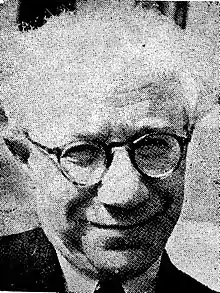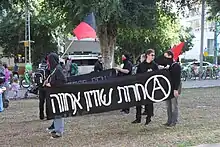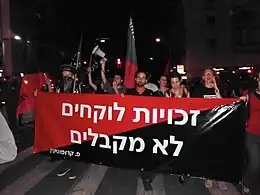Anarchism in Israel
Anarchism has been an undercurrent in the politics of Palestine and Israel for over a century. The anarchist ideology arrived in Palestine at the beginning of the 20th century, carried by a big wave of emigrants from Eastern Europe (Russia, Lithuania, Ukraine, Poland). The ideas of Peter Kropotkin and Leo Tolstoy had remarkable influence on famous exponents of some Left Zionists. Anarchists organized themselves across Israel and Palestine, and influenced the worker movement in Israel. Anarchists often call for a zero state solution, to the Palestinian Israeli conflict, in reference to a complete abolition of the states of Israel and Palestine.
| Part of a series on |
| Anarchism |
|---|
 |
Early Kibbutz movement
The early kibbutz movement was libertarian socialist in nature. At that time, many leftist Zionists rejected the idea of establishing a Jewish nation-state and promoted Jewish-Arab cooperation.[1][2][3]
The Austrian-Jewish anti-authoritarian philosopher Martin Buber settled in Jerusalem in 1938. Buber considered himself a "cultural Zionist". He rejected the idea of Jewish nationalism and was a staunch supporter of a bi-national solution in Palestine. While many Jewish anarchists were irreligious or sometimes vehemently anti-religious, there were also a few religious anarchists and pro-anarchist thinkers, who combined contemporary radical ideas with the traditional anarchistic trends in Kabbalah and Hasidism.[4]
Ashlag supported the Kibbutz movement and preached to establish a network of self-ruled internationalist communes, who would eventually annul the brute-force regime completely, for “every man did that which was right in his own eyes.”, because there is nothing more humiliating and degrading for a person than being under the brute-force government.[5]
Anarchism in the State of Israel

A little before and immediately after the constitution of the State of Israel, in 1948, there was an influx of western European anarchist survivors of Nazism, educated in Yiddish, and among them, anarchism had a specific and visible presence.[6][7]
Between the end of the 1940s and the beginning of the 1950s, Polish immigrants formed an anarchist group in Tel Aviv whose main exponent was Eliezer Hirschauge, author of a book on the history of the Polish anarchist movement published in 1953. Beginning in the 1950s, Israeli anarchism makes reference to Abba Gordin (1887–1964), writer and philosopher, one of the more remarkable representatives of the Yiddish anarchist movement.[8][9][10]
In 1958, Abba Gordin moved to Israel, and in Tel Aviv, founded a Yiddish anarchist circle, "Agudath Schochrei Chofesh" (ASHUACH), with a library of classic anarchist works in Yiddish, Hebrew, and Polish, and with a large hall for meetings and conferences. He also began to publish a bilingual monthly review (in Yiddish and Hebrew), Problemen/Problemot, which he directed from 1959 to 1964.[11]

Contemporary anarchist movement

Anarchists Against the Wall supports Palestinians against segregation in the West Bank and takes direct actions against the Israeli government with demonstrations, human blockades, and destruction of the border fence.[12]
One Struggle (Ma'avak Ehad) is a social anarchist affinity group in Israel.[13]
References
- Chomsky, Noam (1987). "Part I. Interview". The Chomsky Reader. New York, New York: Pantheon Books. p. 7. ISBN 0-394-75173-6. Archived from the original on 28 May 2013. Retrieved 12 August 2011.
…efforts at Arab-Jewish cooperation within a socialist framework, opposed to the deeply antidemocratic concept of a Jewish state (a position that was considered well within the mainstream of Zionism).
: - Watzal, Ludwig; Chomsky, Noam (9 June 1997). "Israel in Global Context: Noam Chomsky interviewed by Ludwig Watzal". Challenge (44). Archived from the original on 23 September 2015. Retrieved 12 August 2011.
...Zionism meant opposition to a Jewish state
- Buhle, Paul (1983). "Anarchism and American Labor". International Labor and Working-Class History. 23 (23): 21–34. doi:10.1017/S0147547900009571. JSTOR 27671439. S2CID 144893328.
- Gabay, Clive (June 2020). "Exploring a European tradition of allyship with sovereign struggles against colonial violence: A critique of Giorgio Agamben and Jacques Derrida through the heretical Jewish Anarchism of Gustav Landauer (1870–1919)". Contemporary Political Theory. 19 (2): 251–273. doi:10.1057/s41296-019-00358-4. S2CID 210479099. Archived from the original on 2020-05-29. Retrieved 2021-02-20.
- Ashlag, Yehuda. "Building the Future Society". Bnei Baruch Kabbalah Education & Research Institute. Archived from the original on 2007-10-17. Retrieved 2006-12-10.
- Biale, David (Winter 1983). "Gershom Scholem and Anarchism as a Jewish Philosophy". Judaism. New York. 32 (1): 70–76. ProQuest 1304354856.
- Moya, Jose C. (2004). "The Positive Side of Stereotypes: Jewish Anarchists in Early-twentieth-Century Buenos Aires". Jewish History. 18 (1): 19–48. doi:10.1023/B:JEHI.0000005735.80946.27. S2CID 144315538.
- Zimmer, Kenyon (2015). Immigrants against the State: Yiddish and Italian Anarchism in America. University of Illinois Press. ISBN 978-0-252-09743-0.
- Gordon, Uri (2009). "Anarchism, Israel and Palestine". The International Encyclopedia of Revolution and Protest. pp. 1–3. doi:10.1002/9781405198073.wbierp0060. ISBN 978-1-4051-9807-3.
- Reizbaum, Marilyn (2005). "Yiddish Modernisms: Red Emma Goldman". MFS Modern Fiction Studies. 51 (2): 456–481. doi:10.1353/mfs.2005.0045. S2CID 153454748.
- Gordon, Uri (2007). "Israeli anarchism: Statist dilemmas and the dynamics of joint struggle". Anarchist Studies. London. 15 (1): 7–30. ProQuest 211036137.
- Gordon, Uri (2011). "Anarchists Against the Wall". The International Encyclopedia of Revolution and Protest. pp. 1–2. doi:10.1002/9781405198073.wbierp1754. ISBN 978-1-4051-9807-3.
- "B o r d e r l a n d s e-journal". Archived from the original on 2007-02-05. Retrieved 2007-02-15. para.7
Bibliography
- Nedava, Joseph (January 1974). "Abba Gordin: A portrait of a Jewish anarchist". Soviet Jewish Affairs. 4 (2): 73–79. doi:10.1080/13501677408577196.
External links
- Archived 2011-09-29 at the Wayback Machine An article on Israeli anarchism today by Uri Gordon
- It's All Lies - Israel anarchist and radical scene
- Oved, Yaacov (2000). "Anarchism in the Kibbutz Movement". Kibbutz Trends. 38: 45–50. Archived from the original on 6 October 2007.
- Anarchism Eight Questions on Kibbituzim - Answers from Noam Chomsky, Questions from Nikos Raptis, from Znet Commetnaries, August 24, 1999
- Yiddish Anarchist Bibliography at Kate Sharpley Library
- Les Anarchistes, le sionisme et la naissance de l'État d'Israël, by Sylvain Boulouque
- Indymedia in Israel
- East Mediterranean Libertarians